SJF<Life & Work Balance> #6
Who Am I and How Should I Live My Life?
Han Hye-kyung
(PhD Social Welfare Studies, Former Professor at Honam University)
나는 누구이고 어떻게 살고 싶은가?
한혜경 (前 호남대학교 교수, 사회복지학 박사)
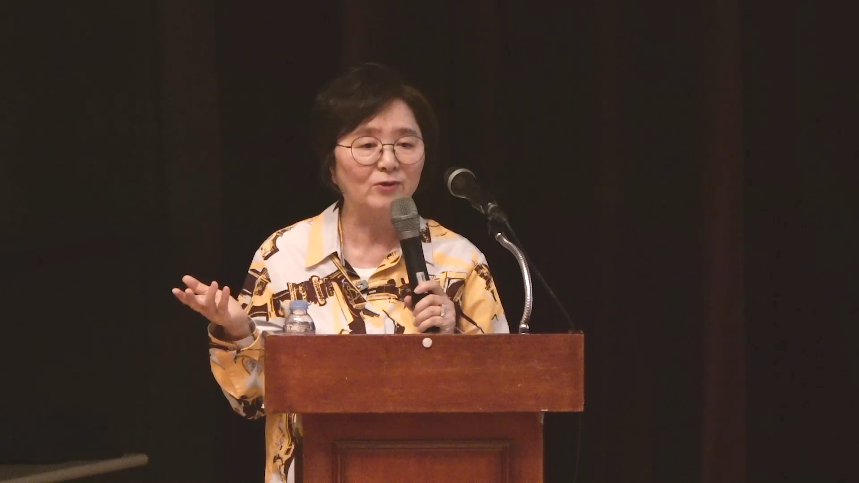
She earned a BA degree in French literature, MA in women's studies, and Ph.D. in social welfare from Ewha Womans University. The unique academic background across humanities and social sciences is becoming a force to look at the world and write with different perspectives. She worked as a senior researcher at ‘Korea Institute for Health and Social Affairs’ and became a professor specializing welfare for senior citizens and published several papers. Also, she published the books titled “I Dream of Retirement Every Day” and “25 Things Men Regret When Retiring”. Besides, she released columns in the media such as The Dong-A Ilbo, the Munhwa Ilbo, and the Women's Newspaper.
한혜경 교수는 이화여자대학교 불어불문학과를 졸업하고 동 대학원에서 여성학 석사 학위와 사회복지학 석사 박사 학위를 받았다. 인문학과 사회과학을 넘나든 독특한 학력은 다양한 시각으로 더 넓고 깊게 세상을 바라보는 힘이 되었고, 학업을 마친 후, ‘한국보건사회연구원’의 책임연구원으로 재직했으며 40대 초반에 대학으로 자리를 옮겨 노인복지를 세부 전공으로 연구하며 다수의 논문을 발표했다. 저서로는 <나는 매일 은퇴를 꿈꾼다><남자가, 은퇴할 때 후회하는 스물다섯 가지>가 있으며, 동아일보, 문화일보, 여성신문 등, 다양한 매체에 칼럼을 연재했다.
1. My Identity as A Writer <나의 정체성: 글 쓰는 사람>
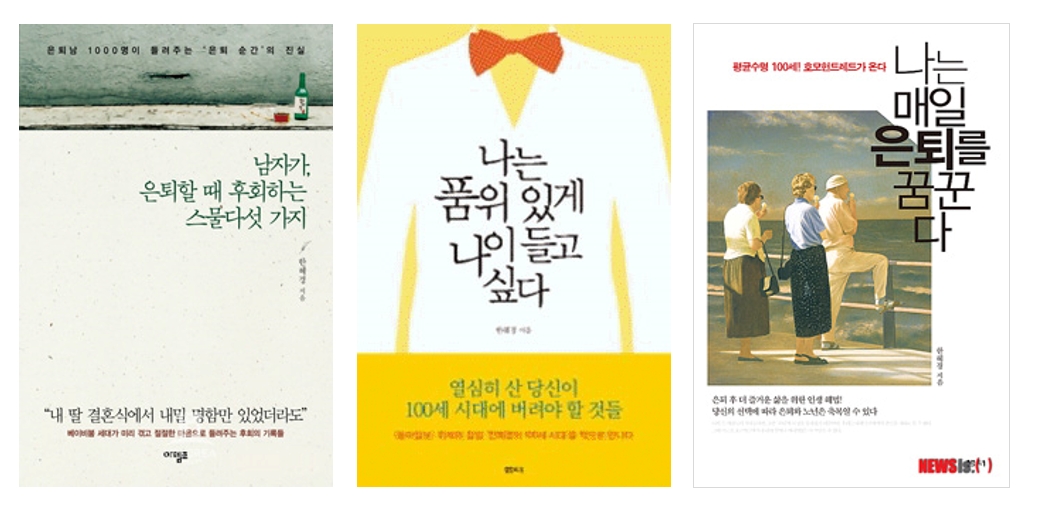
한혜경 교수 저서
For several years, I very much looked forward to retirement. I had high hopes that it’d open a new chapter in my life; I planned to live differently. I wanted to enjoy more freedom. I’d already exerted myself for many years. Throughout my 20s, I juggled two jobs. After completing my graduate studies at age 32, I continued to work two jobs. All in all, I’d had no fewer than four jobs. Working nonstop since my youth, I’d had a fair share of the bitter organizational culture. So, I promised myself that after retirement, I would no longer be bound to work. Instead, I would do all the things that I’d always wanted to do—such as spending more time with my loved ones, and taking walks more frequently. Surely, making time to socialize at least 2~3 times a week would bring more warmth into my life.
정년퇴직하기 몇 년 전부터 은퇴를 엄청 기다렸다. 인생의 또 다른 장이 시작될 것이라는 기대 때문이었다. 전과는 좀 다르게 살고 싶었다. 어떻게? 좀 더 자유롭게. 그동안 일도 할 만큼 했다. 20대에 두 개의 직장을 거쳤고, 대학원을 졸업한 서른 두 살 이후로도 두 개의 직장에서 줄곧 일했으니 총 4개의 직장을 거쳐 온 셈이다. 어쨌든 서른 두 살 이후로 쉬지 않고 일했고, 조직의 쓴맛도 충분히 맛본 터였다. 은퇴하면 더 이상 일에 매이지 말고 하고 싶었던 것 실컷 하고 잘 놀아야겠다, 만나고 싶었던 사람들도 만나야겠다고 생각했다. 걸을 데가 많은 동네에서 살면서 많이 걷고, 일주일에 적어도 2, 3일 정도는 사람들 만나면서 따뜻하게 살아야겠다고 생각했다.
With less a year left before my retirement, one autumn day, my younger acquaintance ‘S’ sent me a copy of Writing One’s Own History by Takashi Tachibana. The book introduced me to the Rikkyo Second Stage College—a year-long course for senior citizens aged 50 and above launched in 2008—at Rikkyo University. I was fascinated by the course ‘My Personal History Within Modern History’, which encouraged students to explore and write their own personal history. ‘S’ said, “I’d like to have a go at writing my own history. Why don’t you join me and help me sharpen my writing?”
그런데, 은퇴가 1년도 채 남지 않은 어느 가을날, 후배 S가 다치바나 다카시의 책 <자기의 역사를 쓴다는 것>을 보냈다. 일본 릿교(立敎)대학에서 2008년부터 운영하고 있는 ‘릿쿄 세컨드 스테이지 대학(50세 이상을 위한 1년제 대학과정)’에서 개설한 ‘현대사 속의 자기 역사’ 라는 강좌의 내용과 운영 과정, 수강생들이 직접 쓴 ‘자기 역사’의 실제 사례를 흥미진진하게 엮은 책이었다. 그리곤 이렇게 말했다. “저도 그 책에 나오는 것처럼 나의 역사를 써보고 싶어요. 제 글쓰기도 손 봐줄 겸 이참에 선배도 같이 쓰시죠.”
The task turned out to be a difficult one. All my life, I’d been busy running forward without ever looking back. Needless to say, writing about my past all of a sudden felt rather awkward. There was an element of fear. I feared that every time I looked back on my childhood or youth, I’d stumble upon ‘a strange, unfamiliar child’ that I’d never met before, which would then disrupt my hard-earned peace. At the same time, I was reluctant to write about my recent past. I had nothing new to say. What was the point of reiterating stories of bygone days? I was hindered by my ‘usage-oriented’ consideration and calculation. I figured I could just help my acquaintance with her writing and wiggle my way out of it. “Aren’t we in this together? Why should I be the only one exposing my embarrassing past?” Her questions made me realize that perhaps I’d never escape the blame. When you get older, you become afraid of your younger acquaintances. I had no choice but to write my own stories. So, I began by drawing up my own ‘historical timeline’.
하지만 막상 쓰려니 쉽지 않았다. 그동안 앞만 보고 바쁘게 달려왔는데, 갑자기 지나온 과거 이야기를 쓰려니 뭔가 어색했다. 약간의 두려움도 있었다. 특히 어린 시절의 나, 젊은 시절의 나를 떠올릴 때마다 생전 처음 보는 ‘낯설고 이상한 아이’가 툭 튀어나와 힘겹게 얻은 지금의 평화를 깨뜨리면 어떻게 하지? 이 나이에? 라는 생각이 들었다. 최근의 이야기를 쓰는 것도 내키지 않았다. 다 아는 뻔한 이야기 아닌가. 이제 와서 ‘바꿀 수도 없는’ 지나간 이야기를 써봤자 무슨 ‘소용’이 있을까? ‘쓸모’ 위주의 생각과 계산이 나를 가로막았다.
그래서 후배가 글을 쓰도록 격려하는 역할만 하면 안될까, 눈치만 보면서 꾀를 부리고 있었다. 하지만 “같이 쓰기로 한 거 아니었어요? 왜 나만 부끄러운 이야기를 까발려야 하나요?” 라는 후배의 말을 들으니 잘못하면 두고두고 비난을 받을 것 같았다. 나이 들면 후배가 두려운 법이다. 아무래도 나의 이야기도 써야 할 것 같았다. 그래서 쓰기 시작했고, ‘역사 연표’ 만드는 것부터 시작했다.
Then, one day, a new thought occurred to me: ‘I should continue writing after retirement. Instead of idling away my time, I should devote myself to writing.’ To this day, I have no logical explanation as to why I came to that conclusion. I was simply seized by a powerful urge to keep writing. Maybe I heard a kind of ‘order to advance’ telling me to push forward. At any rate, I felt I had so much left to write about.
그런데, ‘나의 역사 연표’를 만드는 과정에서 갑자기 이런 생각이 들었다. ‘아, 난 은퇴한 후에도 글을 써야겠다, 여기저기 돌아다니지 말고 쓰는 일에 몰두해야겠다.’ 왜? 그런 생각을 했을까? 논리적으로 설명하긴 힘들다. 하지만 뭔가 더 열심히 써야 한다는 느낌이 강하게 왔다. ‘좀더 나아가라’는 일종의 ‘진격명령’ 같은 것을 들은 것 같기도 하고, 여전히 쓸 게 많다는 생각도 들었다.
My Retirement Diary
After retirement, I began publishing ‘My Retirement Diary’ on the online journal run by Mirae Asset Retirement Institute. I had already written several essays based on interviews with retirees of the baby boom generation. This time, my aim was to write more personal and private stories about my own life after retirement. In fact, I was curious to see what would unfold next. Would it taste sweet or bitter? I wanted to discuss what it was like to be in one’s 60s. There’s so much talk and writing by young people these days, but not enough by older people. We don’t know much about what’s on their minds or what worries them. By sharing my own stories, I hoped to improve intergenerational communication. Wouldn’t that be the only way for people of different generations to understand and communicate with one another? In my essays, I try to be as frank as I can about my bittersweet post-retirement life, my precarious relationship with my husband and stories of my friends.
‘나의 은퇴일기’
은퇴 직후부터 미래에셋 은퇴연구소의 온라인 저널에 ‘나의 은퇴일기’를 연재하고 있다. 그동안 베이비붐 세대의 은퇴자를 인터뷰한 내용을 기반으로 글을 쓰고 책을 냈다면, 이번에는 나 자신의 은퇴 후 삶에 대한 개인적이고 사적인 이야기를 해보고 싶었다. 사실 나 스스로도 궁금했다. 은퇴 후 삶은 어떻게 펼쳐질 것인가? 달콤한 맛일까? 씁쓸한 맛일까?
이글을 통해 60대의 삶에 대해서도 말하고 싶었다. 요즘 젊은 사람들의 말과 글은 넘쳐나는데 나이 든 사람들은 너무 말이 없다. 무슨 생각을 하는지, 어떤 고민을 하는지 잘 알지 못한다. 세대간 소통을 위해서라도 우선 나 자신의 이야기를 해야 한다고 생각했다. 그래야 여러 세대가 서로 이해하고 소통도 되지 않겠나? 은퇴 후의 달콤씁쓸한 일상, 남편과의 아슬아슬하고 위험한 관계, 친구 이야기 등등 소소한 이야기를 최대한 어깨 힘 빼고 솔직하게 쓰려고 노력하고 있다.
Writing My Personal History Class
Having discovered the power of writing one’s own history, I put together two teams of five and launched ‘Writing My Personal History Class’. Once it got started, I realized I only have a small role to play. I helped my students draw up their historical timelines and create a table of contents covering all major turning points in their lives. Then I listened to their presentations and asked a few questions. Some people found writing scary, but I emphasized that they didn’t necessarily have to be good writers. The purpose of the project was not to produce sophisticated writing—they could always modify or polish their essays later. What mattered more was how deeply and honestly they explored their own personal history, so they could convey it on paper.
‘나의 역사 쓰기’ 교실
후배와 함께 한 역사 쓰기 과정을 통해서 자기 역사 쓰기의 힘을 발견한 나는 5명을 한 팀으로 하여 2팀을 만들어서 ‘나의 역사 쓰기’ 교실을 열었다. 내가 하는 역할은 크지 않다. 처음에 ‘역사 연표’를 통해 자기 인생의 변곡점을 중심으로 목차를 구성하도록 도와주고, 원고를 발표할 때 잘 듣고 약간의 질문을 하는 정도다. 글쓰기가 두렵다는 사람도 있었지만 글을 잘 써야 한다고 강조하고 싶지 않다. 이 작업의 목적은 멋진 글을 쓰는 게 아니기 때문이다. 글을 수정하고 다듬는 건 나중에라도 얼마든지 가능한 일이다. 더 중요한 건 스스로가 자기 역사를 얼마나 깊고 솔직하게 들여다보고 표현하는가 하는 점이다.
To my amazement, the whole process transformed and healed people, making them happier and healthier. I found it very touching. We live in times when most relationships are superficial and capitalistic; despite floods of emojis and ‘likes’ everywhere, people do not genuinely listen or talk to one another. Therefore, I was grateful and delighted that we could fully share our past and present, not to mention moments of laughter and tears.
Writing can put a strain on my health, and I find myself getting stroppy at times. Yet, there’s an advantage for sure. In times of sadness or struggle, I often tell myself, “I’ll write about this experience later. That’ll make me feel better.” That’s how I keep myself from getting swallowed up by sadness. I’ve thus confirmed my identity as a writer; writing gives me strength.
신기한 건 내가 별로 해준 게 없는데도 자기 역사를 쓰는 사람들 자신이 치유되고 변화되고 건강해지고 행복해한다는 점이다. 그것 자체가 큰 감동이었다. 자본주의적이고 피상적인 만남, ‘좋아요’와 온갖 이모티콘이 판을 치지만 정작 상대방의 마음에는 귀를 기울이지 않는, 건성의 대화가 판을 치는 요즘 세상에 누군가의 과거와 현재를 온전히 공유하고, 같이 울고 웃을 수 있다는 게 얼마나 소중한 일인가, 감사하고 행복하다.
글 쓰는 일은 건강에도 좋지 않고, 성격도 점점 까칠해진다고 느낄 때가 많지만, 그래도 좋은 점이 있다. 어떤 일을 겪을 때, 특히 슬프거나 힘든 일이 있을 때, ‘나중에 이걸 써야지. 그러면 나을 거야. 괜찮아질 거야’라고 생각하곤 한다. 그 힘든 상황이 나를 삼키지 못하도록. 나의 정체성은 ‘쓰는 사람’이고 나의 힘은 쓰는 데서 나온다.
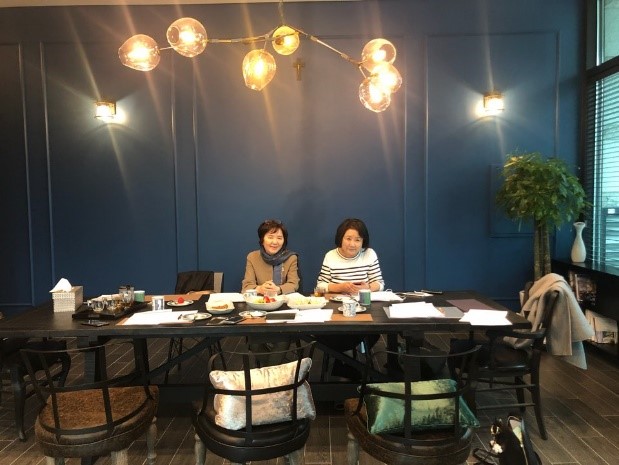
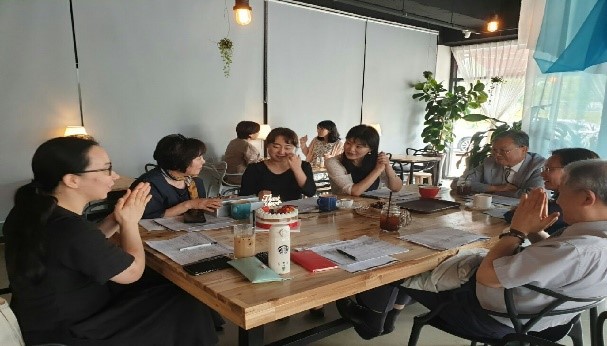
동료들과 함께 읽고 쓰고 일하는 모습
2. Even though I’m Good at Spending Time Alone…
<혼자서도 잘 노는 편입니다만>
I’m quite good at spending time alone. I feel that’s an attribute you must acquire with age, and have written extensively on this topic. Just because there’s nobody to walk beside me doesn’t mean I should give up on taking walks altogether. As you get older, it becomes more and more difficult to find someone with whom you form a deep connection, and who has a similar amount of free time and physical strength as you. Therefore, you need to be able to immerse yourself in activities that you enjoy alone. I believe that you can only share true love and friendship when you are an independent individual. For that reason, I’ve tried not to owe anyone anything as far as possible—whether it be money, a drink or even emotional debt. Even when I have a problem, I do not normally turn to others for help. I’m the type to endure hardships alone without saying anything.
난 혼자서도 잘 노는 편이다. 나이 들수록 혼자서도 잘 놀 수 있어야 한다고 생각하고 이런 내용의 글도 여러 번 썼다. 같이 걸을 친구가 없다고 내가 좋아하는 걷기를 포기할 수는 없지 않은가? 나이 들수록 마음도 잘 맞고, 시간도 잘 맞고 체력도 비슷한 친구를 만나기는 쉽지 않으니 혼자서도 즐거이 몰두할 수 있는 놀이를 가져야 한다고 주장했다.
그리고 평소에 독립적이고 평등한 개인이 되어야만 진정한 사랑과 우정을 나눌 수 있다고 생각하는 사람이다. 그래서 현금은 물론 술 한 잔도, 가능하면 감정에도 빚을 지지 않으려고 노력했다. 힘든 일이 있을 때도 웬만하면 남에게 도와 달라고 부탁하지 않으며, 내 문제를 혼자서 끌어안고 묵묵히 고통을 견디는 그런 사람으로 살아왔다.
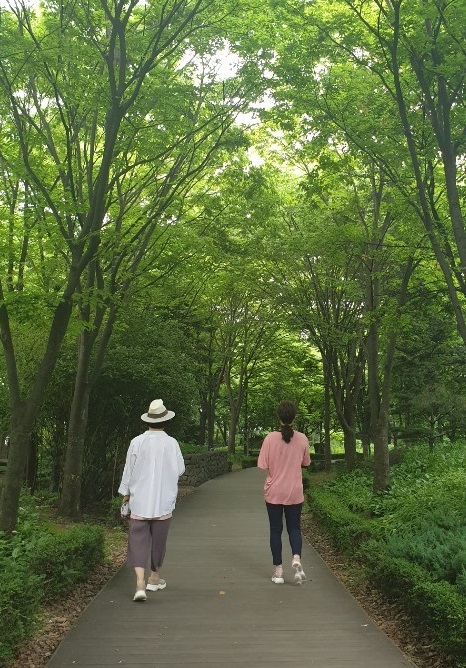
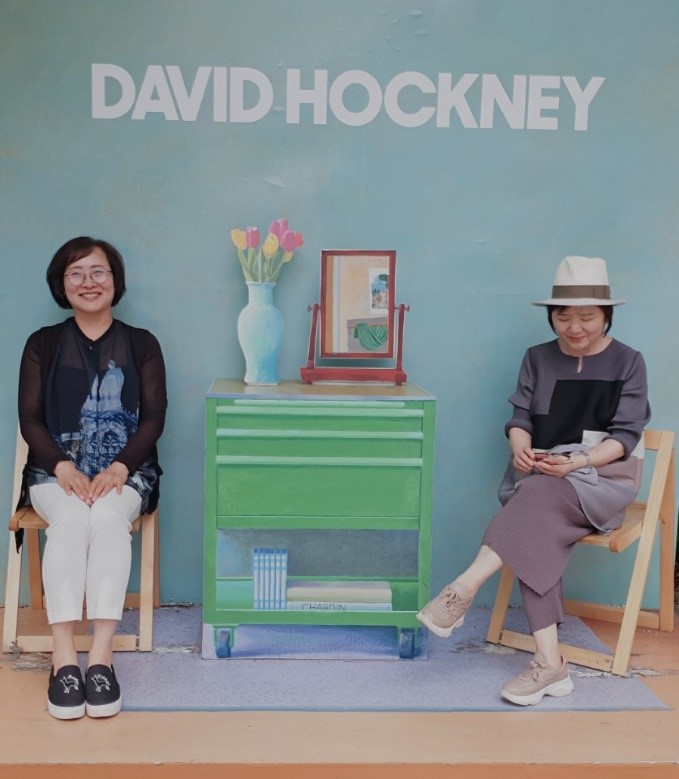
(좌) 하루 중 가장 좋아하는 시간은 걷는 시간, 남산 산책로에서 (우) 작년 서울시립미술관에서 열렸던 데이비드 호크니전에서 친구와 함께
Even though I’m good at spending time alone, I find that my mind goes blank if I go several days without talking to anyone. In fact, I won’t even last three days. I will be unable go about my daily activities; nor will I be able read or write. “Am I lonely? Or, am I too free?” I ask myself in such moments of confusion. Amazingly, the light in my head comes back on as soon as I meet up with a friend. It doesn’t take a serious discussion or a heartfelt conversation. If I just meet up with someone for a meal or a coffee break to talk about this and that, then the clock in my head starts ticking again and I feel that I’m alive. When that happens, I realize all over again that I miss people and long for human connection. Nobody can live on their own. We need to keep distance yet interact with one another. Indeed, relationships can be suffocating, but it’s those relationships that give us strength at the end of the day. Time and again, I appreciate all over again that I, too, need to meet and share things with others.
하지만 이렇게 혼자서도 잘 노는 나도 며칠 아무도 만나지 않고 집에만 있다 보면 갑자기 머릿속이 하얘지는 느낌이 들 때가 있다. 단 3일만 지나도 그렇다. 아무것도 손에 잡히지 않고 글도 써지지 않는다. 책도 읽을 수가 없다. ‘내가 외로운가? 아니면 지나치게 자유로운 건가?’ 혼란스러운 순간이다. 이럴 때 참 신기한 경험을 할 때가 있다. 누군가를 만났을 때, 하얘졌던 머릿속에서 다시 불이 켜지는 경험이다. 뭐 대단히 중요한 대화를 나누거나 굉장한 이야기를 하지 않아도 좋다. 그냥 누구랑 만나 밥 같이 먹거나 커피 한잔하면서 그렇고 그런 이야기, 해도 좋고 하지 않아도 좋은 이야기를 하다 보면 어느새 멈췄던 머리 속의 태엽이 다시 돌아가고 내가 살아있음을 확인하는 것이다.
이런 순간마다 새삼 깨닫는다. 아, 나는 사람이 그립구나, 사람들과 연결되고 싶어 하는구나. 아, 인간은 결국 혼자 살 수 없다. ‘따로 또 같이’가 필요하다. 관계 속에서 질식할 것 같다가도 인간을 그리워하고, 관계 속에서 힘을 받는다. 나 또한 늘 누군가를 만나 무언가를 나누며 살아야 하는 존재라는 걸 새삼 실감한다.
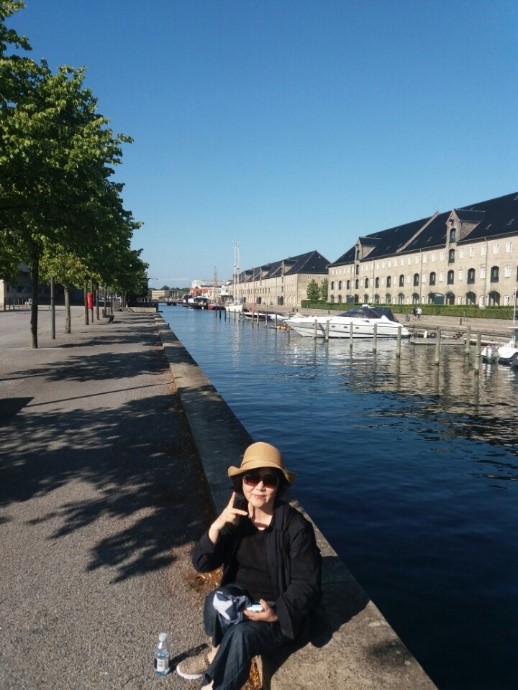
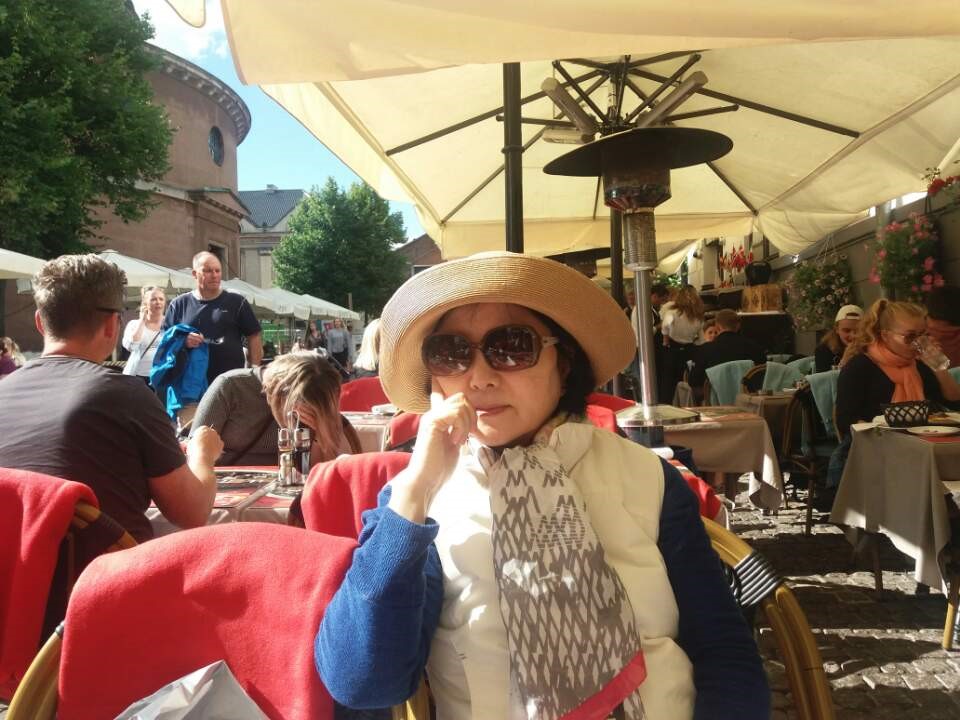
북유럽 사람들의 행복한 일상의 비밀을 연구하기 위해 떠난 여행, 덴마크 코펜하겐에서.
I once read a fascinating story in La Vie commence a 60 ans by Bernard Ollivier (author of Longue marche: suite et fin). Ollivier undertook a long 12,000 km walk along the silk road at age 62. However, before he turned 60, when he was about to wrap up his career in journalism that had spanned 30 years, he began to suffer depression, which got so severe that he even contemplated putting an end to everything. His depression was caused by the deaths of his wife and mother and his dismissal from work.
He’d already set the date for departing from this world when his nephew, who lived far away, rang him up one day. “Uncle, may I come over to your place and spend the year-end holiday with you?” This simple phone call saved his life. After he spoke to his nephew on the phone, he “felt like the darkness had lifted.” He added, “I could still be useful. It was proof that I existed for someone. I looked around me and saw the wretched state of my apartment. I couldn’t imagine welcoming my nephew into that mess. I spend days cleaning up the apartment—re-plastering the walls and laying out new floor mats. By the time Christmas came around, my little place looked pretty decent, and I no longer felt suicidal.” It wasn’t until two years later that he confessed to his nephew—like a passing joke—that his phone call that day had helped him hold on to life.
<나는 걷는다>라는 작품으로 유명한 베르나르 올리비에의 책, <떠나든 머물든> 에는 흥미로운 이야기가 나온다. 예순 두 살의 나이로 1만 2000킬로미터에 이르는 실크로드를 걸어서 여행한 올리비에였지만, 예순이 되기 전, 올리비에는 30년간의 기자 생활을 끝내기 직전에 심각한 정도의 우울감에 빠졌고, 모든 걸 끝내 버리자는 극단적인 생각까지 한 적이 있었다고 한다. 우울감의 원인은 아내와 어머니의 죽음, 직장에서의 해고 등이었다.
그런데, 이 세상에서 사라질 날짜까지 잡고 죽음을 준비하고 있던 그에게 어느 날 먼 곳에서 살고 있던 조카가 전화를 걸어왔다. “삼촌, 저랑 마르크랑 마갈리, 다 같이 삼촌댁에서 연말을 보내고 싶은데, 우리 재워 주실 수 있으세요?”이 어찌 보면 아무렇지도 않은 전화 한 통이 그의 삶을 바꿔 놓았다. 조카의 전화를 받은 후의 심정에 대해 올리비에는 이렇게 썼다.
“전화를 끊고 나자, 어둠은 한층 물러나 있었다. 난 아직도 무언가에 쓸모가 있었다. 내가 누군가를 위해 존재한다는 증거이기도 했다. 난 폐허처럼 엉망이 된 아파트의 가련한 꼬락서니를 돌아보았다. 이런 창고에서 그 아이들을 맞는다는 건 상상도 할 수 없었다. 밤을 새워가며 흙더미를 치우고, 벽을 새로 바르고, 도배하고, 장판을 깔았다. 크리스마스가 되자, 내 작은 숙소는 제법 보여줄 만한 상태가 되었고, 자살 충동도 사라져버렸다.”
그는 2년이 지난 후에야, 그저 지나가는 농담처럼 조카에게 고백했다고 한다. 조카의 전화 한 통이 본의 아니게 자신을 삶에 붙들어두었노라고.
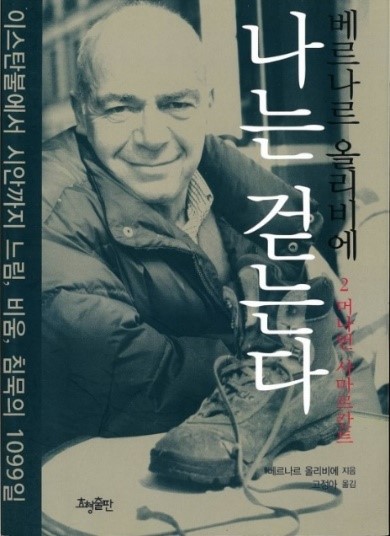
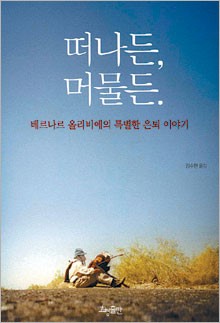
베르나르 올리비에의 저서. 『나는 걷는다』『떠나든, 머물든.』 베르나르 올리비에
In keeping with the government’s social distancing measures in the wake of COVID-19, I’ve been spending a lot of time alone. Nonetheless, I should call my friends and neighbors every now and then, and perhaps even ask for favors. It’s about time I changed my principle of ‘never being a burden on others’ and bothered those around me sometimes. Now I would like to be at the giving and receiving ends of help. Who knows? That ‘bothersome’ interaction may just give someone a reason to live.
코로나 이후 사회적 거리 두기의 압력이 커지면서 혼자 있는 시간이 더 많아졌다. 하지만 가끔은 친구나 이웃들에게 뜬금없는 전화도 하고, 부탁도 해야겠다고 생각한다. ‘남에게 폐 끼치지 않는다’는 어설픈 신조를 바꾸어 때로는 폐도 끼치는 사람이 되어야겠다. 도움을 주기도 하지만, 도움을 청하기도 하는 그런 사람이 되어야겠다. 혹시 아는가. 우리가 서로 끼치는 그 ‘폐’가 누군가에게는 살아야 할 이유가 될 수 있을지.











